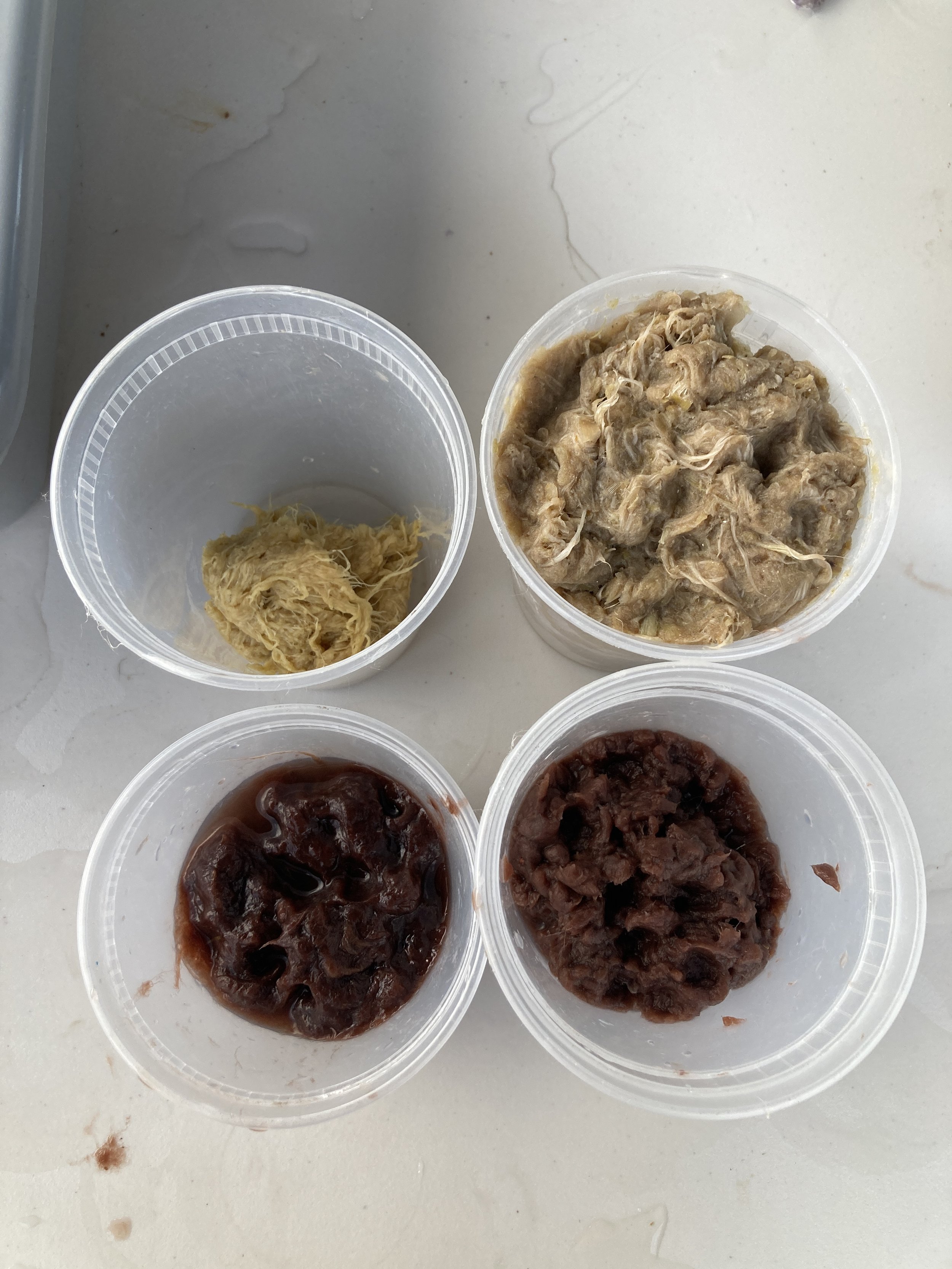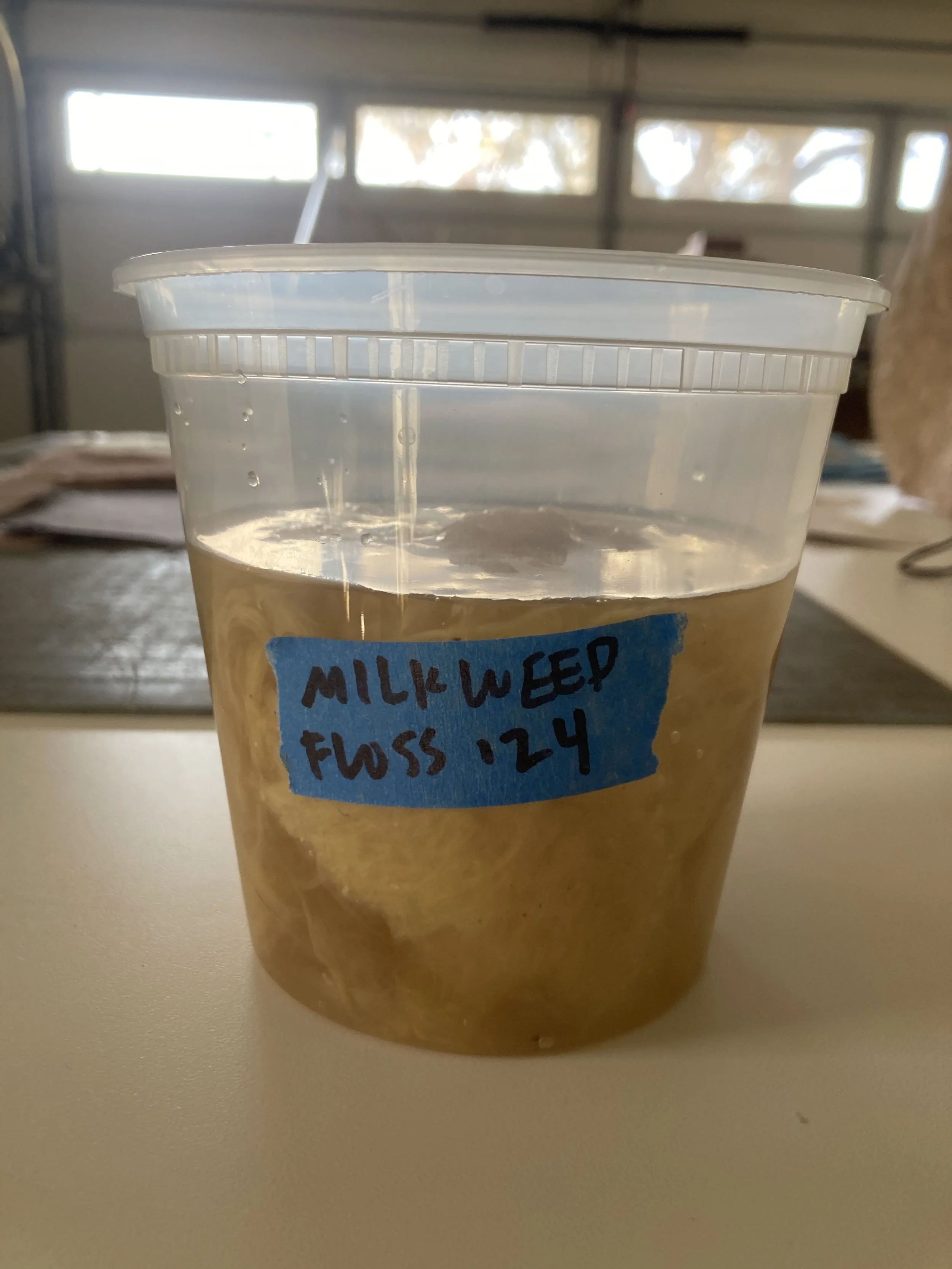After gathering, trimming, steaming, stripping, drying, weighing, and storing the hibiscus and milkweed from September, I had no intention of processing it for papermaking this year. I tend to close down the papermaking studio at the end of the summer and focus on indoor activities. But then after a series of "events," I found myself hosting a late-November outdoor papermaking session, and now I am hooked on Fall/Winter papermaking. I suppose that is one of the benefits of living in California, and in many ways the cool crisp air is much more preferable to work in than the unbearable, dry summer heat.
Finished sheets of paper made from hibiscus stalks, milkweed stalks, and milkweed floss. This image also includes raw hibiscus and milkweed materials used to make the sheets, as well as the bamboo screens used to form the small sheets.
I say "events" in "quotes" because they were more like subtle, internal shifts (for the most part). I’ll share three:
Meeting and learning about the work of Diana Almendariz and spending time at the Tending and Gathering Garden at Cache Creek Conservancy, an org that works on habitat restoration and environmental education in the Cache Creek area of Yolo County. I learned of this work through Esme and Tanya, two enthusiastic local makers who have become my dear friends. Through these connections I feel empowered to share, not hoard, what I know. I often tend to downplay what I know for so many reasons, but I am realizing more and more how rare and special it is to hold this knowledge and how crucial it is to pass it on to others.
Attending the NAHP conference in Denver and revisiting the work of Cecile Webster, who has thoroughly studied and made paper with many plants in her region. At first I felt the urge to give up my own research, thinking that it had already been done. But in talking with Mina Takahashi, she gently urged me to keep investigating plants for papermaking in my local ecosystem, how this highly localized work needs to keep going, wherever we are.
The election. Rather than sink into despair, I thought about what I could offer, what small thing I could do. I saw this list from Mariame Kaba and realized that gathering to make things together is deeply powerful, necessary, and liberatory. Offering people a way to interact directly with natural materials, and witness/bring forth their transformation, is profound and healing. If anything, I need this for myself, and I long to do this in community.
And so, I invited some folks to come out for a community papermaking session, working with the hibiscus and milkweed that we had harvested back in September. Our family was not traveling for Thanksgiving, so I had time to do all of the necessary prep work: soaking, scraping, cooking. Here’s the hibiscus:
I also soaked and cooked the milkweed floss that Esme had separated for me, and already I could tell that this was way different than the floss I worked with earlier this year. This time I cooked it in 20% soda ash for 1 hour, per Joanne Rich's advice. As Aimee mentions in her milkweed zine, the soda ash seems to color the fiber yellow:
On Papermaking Day (the Saturday after Thanksgiving), folks came in the morning to scrape raw hibiscus bark, rinse cooked hibiscus, beat milkweed floss and half of the hibiscus, and rinse cooked milkweed bark.
The hibiscus was quite stringy, like clumps of hair… we took half of the cooked hibiscus, cut it up into one-inch pieces, loaded it into the Reina beater, and processed it for about 20 minutes.
Cutting this large clump of hibiscus felt like cutting tangled hair.
Pulps we processed on Saturday, from left to right, top row: milkweed floss - handbeaten, milkweed stalk - partially handbeaten; from left to right, bottom row: hibiscus stalk - handbeaten, hibiscus stalk - Hollander (mechanically) beaten
In the afternoon we made paper:
And Kevin made a wire armature and formed sheets of dak and hibiscus to wrap around the form, to create a lantern shade (also with the help of Michelle):
An experimental paper lantern shade made of copper wire and dak/hibiscus paper. A future workshop, perhaps?
The following day I soaked some of the milkweed floss paper and combined it with the leftover pulp to reprocess in a blender. I had a hard time getting it to break down in the blender, it was so stringy. Next year I want to try processing fresh milkweed floss properly in the beater.
I finally was able to make some sheets that were a little less stringy than the 100% hand beaten floss.
Pressed sheets of milkweed floss paper, drying on a board. The pulp was hand beaten for an hour and then processed in a blender.
Milkweed floss paper formed with a tiny sugeta
Deeply grateful for these opportunities to gather, transform, collaborate, and share. Also grateful to folks who shared knowledge about processing these plants, through resources they have published or conversations we’ve had along the way: James Ojacastro, Helen Hiebert, Joanne Rich, Aimee Lee, Velma Bolyard, Jenna Bonistalli. Thank you for putting your knowledge out into the world.




























